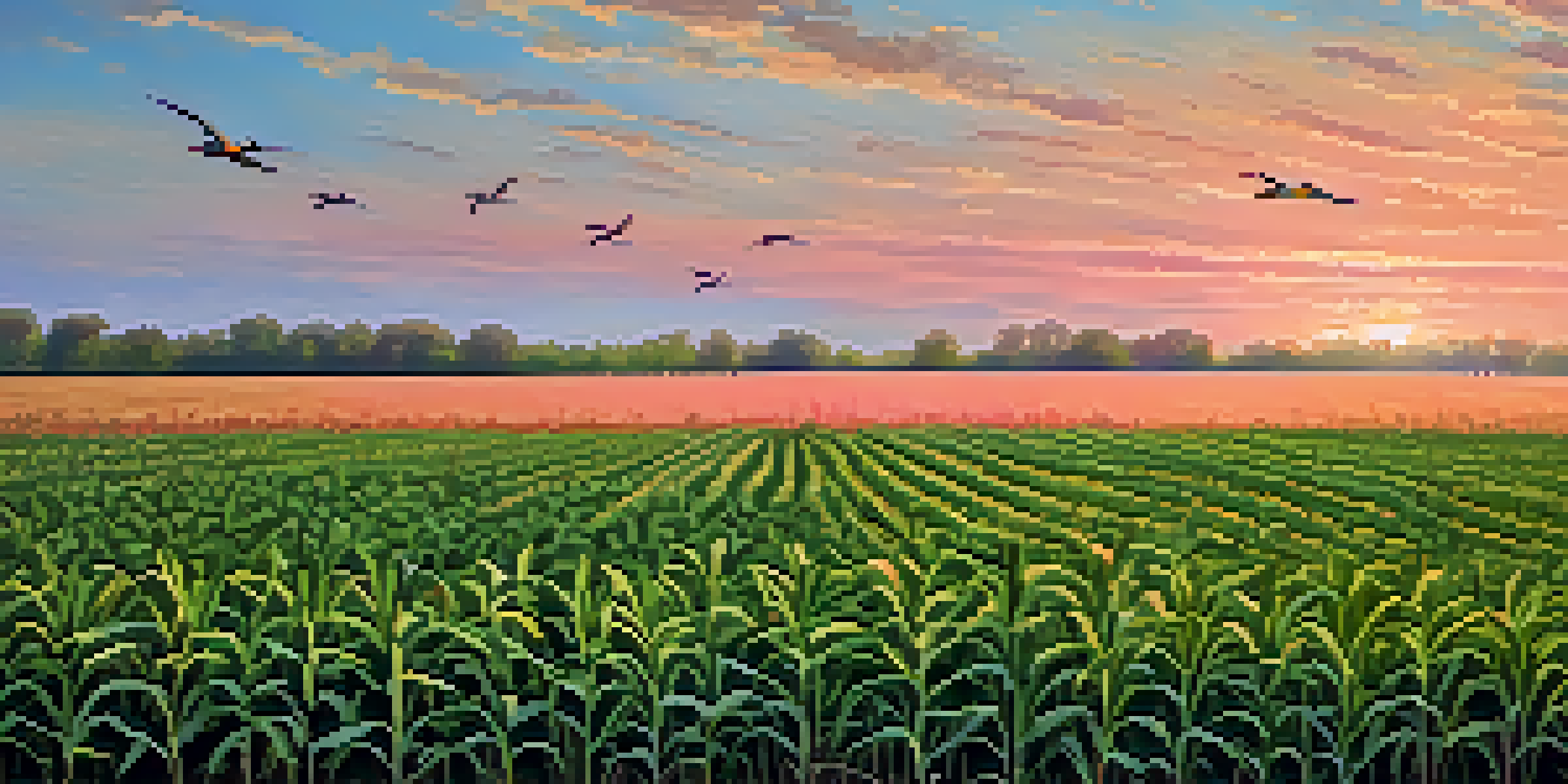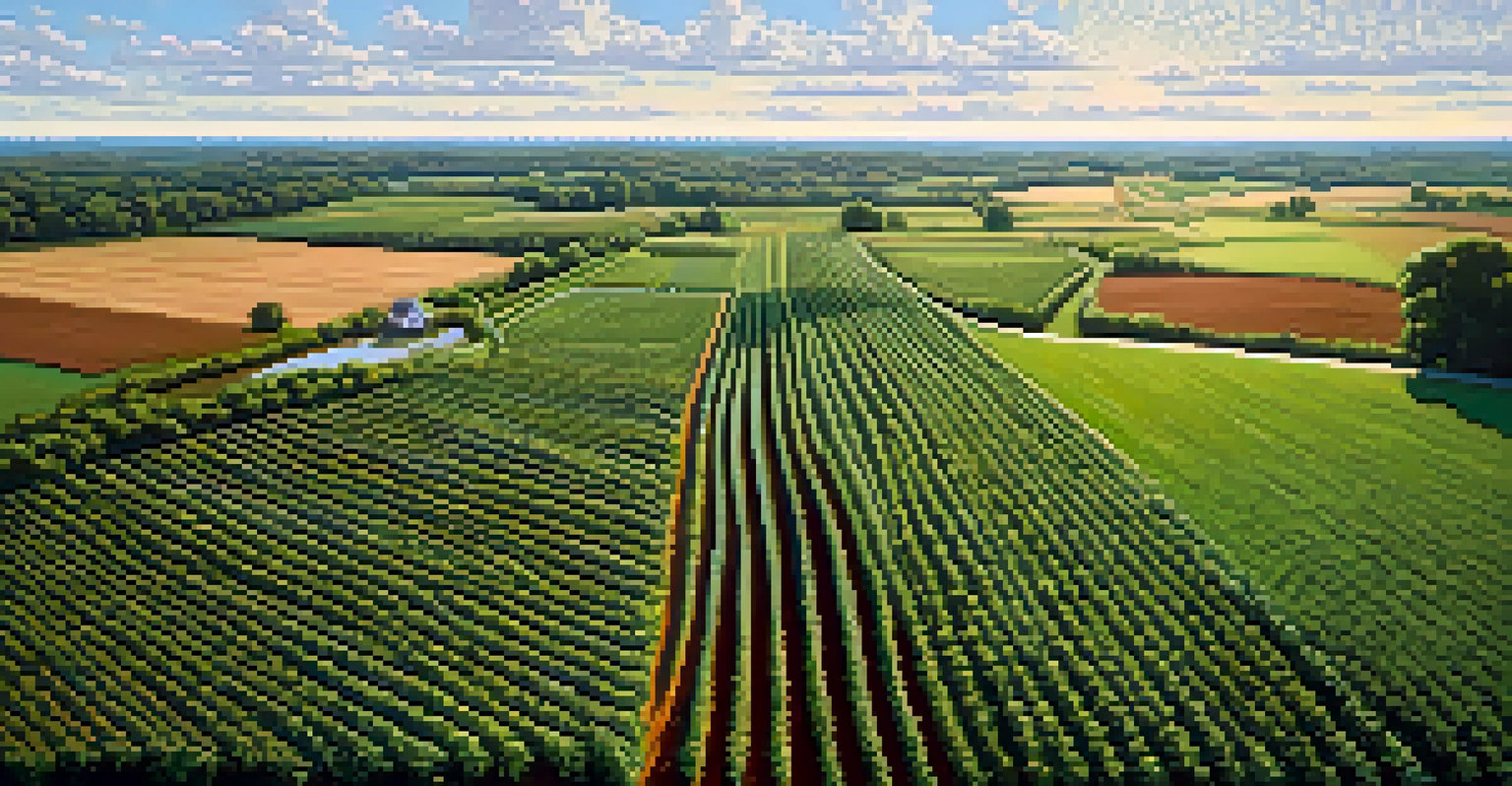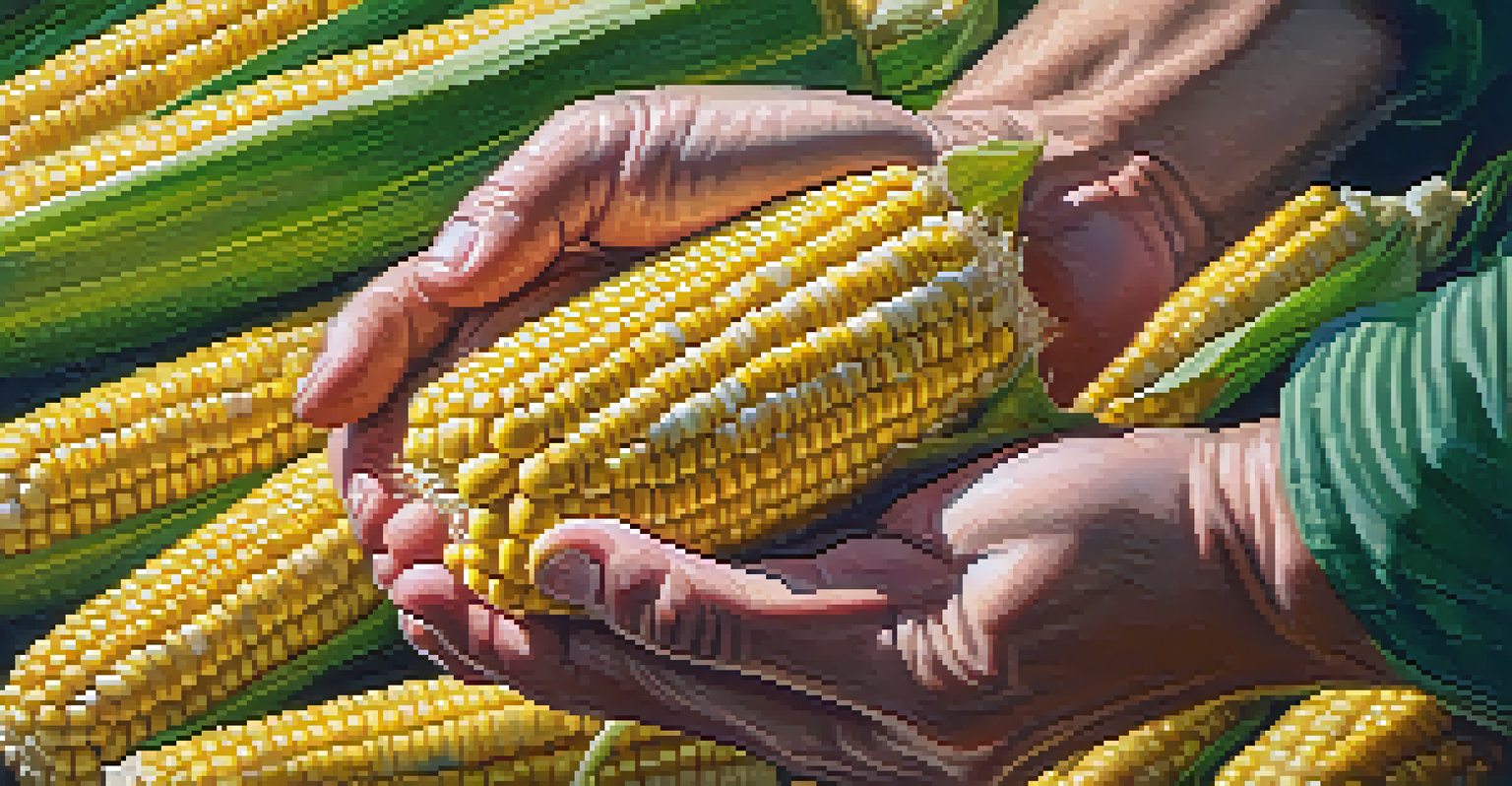The Importance of Illinois Corn and Soybean Production

Illinois: A Leader in Corn and Soybean Production
Illinois stands out as one of the top producers of corn and soybeans in the United States, thanks to its fertile soil and favorable climate. The state's agricultural landscape is characterized by vast fields that stretch for miles, showcasing the importance of these crops. In fact, Illinois consistently ranks among the top three states for corn production, contributing significantly to the nation’s food supply.
Agriculture is our wisest pursuit, because it will in the end contribute most to real wealth, good morals, and happiness.
These crops play a vital role not only in local economies but also in national and global markets. Corn and soybeans from Illinois are essential for various industries, including food, livestock feed, and biofuels. This diverse usage highlights the versatility and importance of these crops in modern agriculture.
Moreover, the production of corn and soybeans in Illinois supports thousands of jobs, from farmers to those involved in processing and distribution. This interconnected web of agriculture illustrates how crucial these crops are to the state’s economy and the nation as a whole.
Economic Impact of Corn and Soybean Farming
The economic contribution of corn and soybean farming in Illinois cannot be overstated. In 2022 alone, the estimated value of Illinois corn and soybean production was over $10 billion, showcasing the significant financial impact on the state’s economy. This revenue not only supports farmers but also stimulates local businesses, from equipment suppliers to grocery stores.

Additionally, the export potential of these crops is enormous. Illinois corn and soybeans are shipped around the globe, feeding populations and fueling economies in other countries. This global demand underscores Illinois' strategic position in the agricultural supply chain.
Illinois' Economic Powerhouse
Corn and soybean farming in Illinois generated over $10 billion in 2022, significantly contributing to both local and global economies.
By investing in modern farming practices and technology, Illinois farmers can increase efficiency and yield, further bolstering their economic impact. As the world’s population continues to grow, the need for sustainable and innovative agricultural solutions has never been more critical.
Environmental Considerations in Agriculture
While corn and soybean production is economically beneficial, it also raises important environmental considerations. Intensive farming can lead to soil degradation, water runoff, and loss of biodiversity. Therefore, Illinois farmers are increasingly adopting sustainable practices, such as crop rotation and cover cropping, to mitigate these effects.
The future of food is not just about feeding the world, but about doing it sustainably.
These practices not only help maintain soil health but also contribute to the overall sustainability of agriculture. By diversifying crops and using environmentally-friendly methods, farmers can reduce their reliance on chemical fertilizers and pesticides. This shift is crucial for protecting the local ecosystem and ensuring the long-term viability of farming in Illinois.
Moreover, various organizations and government programs are promoting sustainable agriculture initiatives, providing farmers with resources and support. By prioritizing environmental stewardship, Illinois can continue to lead in corn and soybean production while also protecting its natural resources.
The Role of Technology in Crop Production
Technology has revolutionized corn and soybean farming in Illinois, making it more efficient and productive. Innovations such as precision agriculture, which uses GPS and data analytics, allow farmers to monitor and manage their fields more effectively. This technology enables targeted application of water, fertilizers, and pesticides, reducing waste and maximizing yield.
Additionally, advancements in seed genetics have led to the development of crops that are more resilient to pests and extreme weather conditions. This is particularly important as climate change poses new challenges for farmers. By utilizing these technological advancements, Illinois farmers can enhance their productivity and sustainability.
Sustainable Farming Practices
Illinois farmers are increasingly adopting sustainable agriculture techniques to protect the environment while maintaining productivity.
The integration of technology in farming not only benefits farmers but also contributes to food security. As global populations rise, the ability to produce more food with fewer resources is essential, making technology a key player in the future of agriculture.
Challenges Facing Illinois Farmers
Despite its successes, Illinois corn and soybean farmers face several challenges that can impact production. Fluctuating market prices, unpredictable weather patterns, and trade policies are just a few of the hurdles they encounter. These factors can create uncertainty, making it difficult for farmers to plan and invest for the future.
Additionally, the rising costs of inputs, such as seeds, fertilizers, and equipment, put financial pressure on farmers. This economic strain can lead to difficult decisions about crop choices and production levels. Farmers must navigate these challenges while striving to maintain their livelihoods.
To overcome these obstacles, many farmers are banding together to advocate for better policies and support systems. By sharing resources and knowledge, they can work towards a more resilient agricultural community in Illinois, ensuring the continued success of corn and soybean production.
The Future of Corn and Soybean Production in Illinois
Looking ahead, the future of corn and soybean production in Illinois appears promising, yet it requires adaptation and innovation. As the agricultural landscape evolves, farmers must embrace new practices and technologies to stay competitive. This includes investing in research and development to discover more efficient farming methods.
Furthermore, the demand for sustainably produced crops will likely continue to grow, pushing farmers to adopt environmentally friendly practices. This shift not only meets consumer preferences but also addresses the pressing need for sustainable food systems. Illinois can position itself as a leader in sustainable agriculture by prioritizing these practices.
Technology Transforms Agriculture
Innovations like precision agriculture and advanced seed genetics are enhancing crop production efficiency and resilience in Illinois.
Ultimately, collaboration among farmers, researchers, and policymakers will be essential for navigating future challenges. By working together, they can create a resilient agricultural sector that continues to thrive and support the economy of Illinois.
Community and Educational Initiatives in Agriculture
Community engagement and education play a crucial role in supporting corn and soybean production in Illinois. Local organizations and universities often provide resources and training for farmers, helping them stay informed about best practices and new technologies. This support fosters a strong agricultural community that shares knowledge and experiences.
Moreover, programs that connect farmers with consumers can enhance the understanding of where food comes from and the efforts involved in production. Initiatives like farm tours and educational workshops promote transparency and build trust between producers and consumers. This connection is vital for sustaining local agricultural markets.

By prioritizing education and community involvement, Illinois can ensure that future generations of farmers are equipped to face the challenges ahead. Engaging youth in agriculture through programs and internships can inspire the next wave of innovators in corn and soybean production.